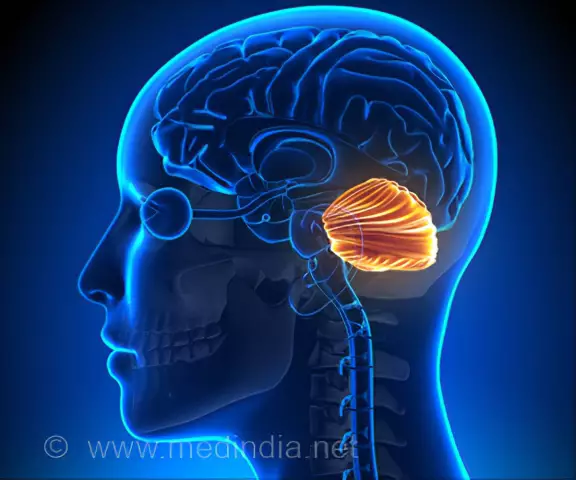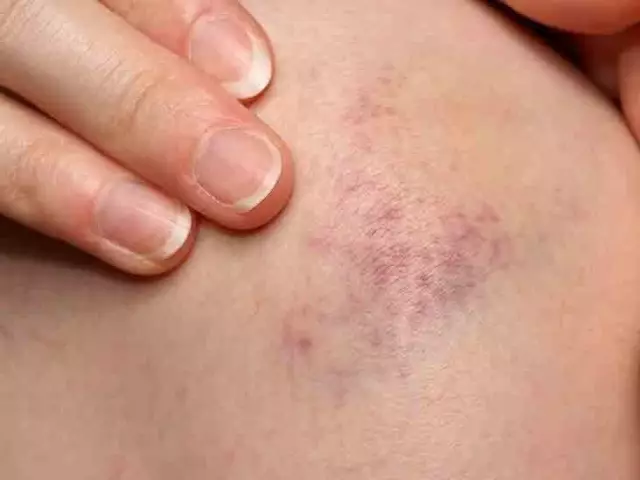- Author Rachel Wainwright wainwright@abchealthonline.com.
- Public 2023-12-15 07:39.
- Last modified 2025-11-02 20:14.
Nervous tic

A nerve tic is an involuntary, repetitive, abrupt contraction of a muscle or muscle group. This phenomenon is frequent, almost all people have encountered the manifestations of a nervous tic themselves, or have observed it.
The most common is a nervous tic of the eye, but few people know that a nervous tic can look both as complex movements, and as shouting out words, including obscene ones, and as pronouncing strange sounds. The disease can manifest itself at any age; a nervous tic occurs in a child 10 times more often than in an adult.
Causes of a nervous tic
Nervous tics can be primary, that is, arising as an independent disorder of the nervous system, and secondary, resulting from a brain disease. A group of hereditary nervous tics is also distinguished.
- Primary or psychogenic nervous tics. Usually, a nervous tic in a child appears between the ages of five and seven, which is considered by child psychologists to be the most vulnerable in terms of emotional impact. The most common cause of a nervous tic in this case is psychoemotional trauma, both acute (one-time stress as a result of, for example, being present during a family quarrel) and chronic (a feeling of abandonment, dislike of the mother, excessive demands on the child). In a number of cases, the cause of a nervous tic remains unclear.
- Secondary or symptomatic nervous tics. They develop as a result of trauma, including birth, tumors or metabolic disorders of the brain in various diseases, being one of the symptoms. Moreover, in this case, the cause of a nervous tic can be not only diseases of the brain and nervous system, but any past diseases that have caused, even for a short period, brain hypoxia, for example, a viral infection. The second group of diseases that can cause a nervous tic are those diseases in which the movement, which later became a tic, was initially forced and fixed reflexively. For example, with chronic tonsillitis, the child was forced to swallow frequently. After removing the tonsils, tonsillitis no longer occurred, and the habit of swallowing was fixed and became a nervous tic in the child.
- Tourette's syndrome. Here the genetic mechanism of transmission of nervous tics works. In this case, the disease often occurs in members of the same family, although not necessarily in the same form. For example, the mother may have a nervous tic in the eye, and the son may have head twitching or repeating the same words.
Types of nervous tics

A nervous tic can be movements of one muscle group, and then they speak of a local or limited nervous tic, or movements in which several muscle groups are involved, and then it is called a generalized nervous tic.
Also, nerve tics can be simple, in which case the movement consists of one element, for example, twitching of the eye muscle with a nervous tic of the eye, or complex, consisting of a group of coordinated but uncontrolled movements, such as jumping.
By their manifestations, nervous tics are divided into three large groups:
- Mimic, or facial. In this type of nerve tics, mainly the facial muscles are involved. Such tics include a nervous tic of the eye (they say the eye "twitches"), frequent blinking, winking, lip movements, and other contractions of the facial muscles.
- Vocal, or vocal. This is a group of complex nervous tics, during which the patient utters either separate abrupt sounds, such as grunts, groans, etc., or words and even phrases. These can be phrases uttered by himself, or repeated endings of phrases (echolalia) after others, or even shouting out curses.
- Nervous tics of the limbs. Trampling, bouncing, hand clapping, etc. belong to this species.
Nervous tic symptoms
The onset of symptoms of a nervous tic is not immediately noticed. The patient himself, especially when it comes to a nervous tic in a child, does not realize this movement for a long time, usually people around him pay attention to strange behavior. As mentioned above, a nervous tic can take on various forms, but all these movements have one thing in common - they cannot be controlled. Patients can anticipate the onset of an attack of a nervous tic, and sometimes even by an effort of will to suppress it, but not for long. Usually, a nervous tic manifests itself more strongly in a state of heightened excitement or fatigue, but in rare cases, on the contrary, it can be especially pronounced during periods of calm and relaxation.
A nervous tic does not lead to a decrease in intelligence, or to a deterioration in the functioning of the nervous system, but can significantly affect a decrease in the patient's psycho-emotional state, especially if the disease causes increased attention, harsh condemnation or ridicule from the environment. Children are especially sensitive to this, therefore, a child's nervous tic can increase in noisy places or with a large crowd of people.
Diagnosis of a nervous tic
The diagnosis of a nervous tic is made by a neurologist after undergoing neurological and psychiatric examinations. The main goal of the examination is to exclude diseases with organic brain lesions, such as tumors, and mental disorders. The conclusion of a specialist is also necessary because often some forms of nervous tics, especially vocal ones, are mistaken for promiscuous behavior. This causes a sharply negative attitude of others, in turn, putting pressure on the patient, which is why the manifestations of a nervous tic are only aggravated.
Treatment of a nervous tic

Usually, special treatment for a nervous tic is not required. So, a nervous tic in a child, which is caused by emotional problems, goes away with the normalization of the psycho-emotional situation in the family and the environment. In advanced cases, psychotherapy has a good effect, during which the existing problem is worked out and in a playful way the child learns to cope with stress. Moreover, in this case, psychotherapeutic consultations are highly recommended for the parents of the child. As a rule, the symptoms of a nervous tic in a child, caused by psychological reasons, or of unknown origin, disappear by the time of puberty.
To normalize a suppressed, overexcited or otherwise disturbed emotional background, mild sedative (sedative) drugs, medicinal or herbal (tincture of motherwort, valerian, etc.) can be used, but not for a long time. The use of potent drugs for the treatment of nervous tics is not recommended, as they cause a large number of side effects that far exceed the therapeutic effect of the drug.
Treatment of nerve tics, which are symptoms of other diseases, consists in treating the underlying disease.
With simple localized nerve tics in adults of a persistent nature, for example, with a nervous tic of the eye, neurotoxic drugs can be used, causing a blockade of nerve impulses going to the motor muscle. Most often, Botox injections are used for this purpose.
YouTube video related to the article:
The information is generalized and provided for informational purposes only. At the first sign of illness, see your doctor. Self-medication is hazardous to health!






